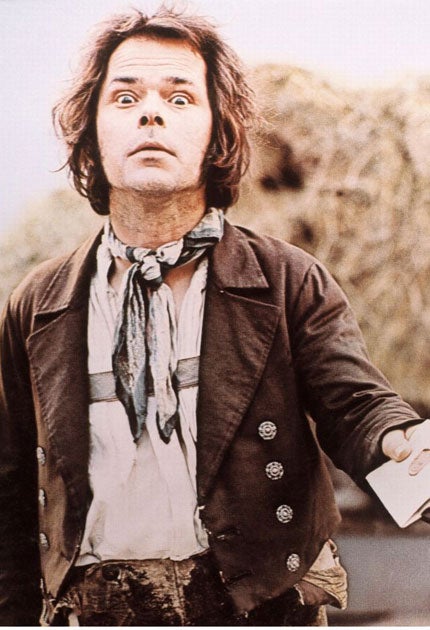Bruno Schleinstein: Actor, musician and outsider artist best known for his film collaborations with Werner Herzog

Bruno Schleinstein – or "Bruno S" – was an outsider musician-artist-actor, best-known for his semi-autobiographical portrayals of Kaspar Hauser and Stroszek for Herzog, who described him as "the unknown soldier of German cinema". But his misfortunes led him to cast a baleful gaze over the world.
Schleinstein's prostitute mother beat him so severely that at the age of three he was left temporarily deaf. She dumped him in an asylum and he spent 23 years as a serial escapee and petty criminal, unvisited by siblings and subjected to Nazi experiments. Unexpectedly released, he worked in a Berlin steel mill, and at weekends busked his own and 19th-century popular songs and sold his naïve paintings. One showed a black-smocked doctor grasping his patient's heart.
In 1970 Schleinstein featured in Lutz Eisholz's documentary Bruno der Schwarze – Es bleibt ein Jäger wohl in sein Horn. Werner Herzog saw it and knew that, despite having no acting experience, Schleinstein was perfect for the script he had completed a few days previously.
The Enigma of Kaspar Hauser (the original title of which was "Jeder für sich und Gott gegen Alle", or "Every Man for Himself and God Against All", 1974) was based on the true story on a young man who mysteriously arrived in Nuremberg in 1828. Having spent his whole life locked in a dungeon, he has no concept of the world, and the film follows his "integration" into society. However, his unusual outlook defeats those who would "civilise" him. A logic problem is deftly defeated with infallible child-like nonsense, while an apple apparently confirms Kaspar's view that it has a will of its own.
Wide-eyed and shock-haired, Schleinstein perfectly balanced the sense of wonder at a new world, and the acceptance of extraordinary events as "normal". He never removed his costume during the shoot, and his strange delivery is intensified by Herzog's insistence that he speak High German rather than his native Berlin dialect. Though it's hard to separate performance and reality, Herzog claimed Schleinstein was drawing on his own life – he did a sketch of himself in the role, entitling it "When I Became Human I Had to Die".
The film won three prizes at Cannes and encouraged Herzog to consider more collaborations. They planned to film Büchner's Woyzeck, but at the last minute Herzog changed his mind and cast Klaus Kinski. As the deflated Schleinstein had already booked unpaid leave from the steel mill, Herzog postponed the film and wrote Stroszek (1977) for him in four days. In it, an alcoholic ex-prisoner ekes out a living as a busker. He befriends Eva, a prostitute, but her pimps beat them up. With a cranky elderly neighbour they leave for Wisconsin, where the film ends in enigmatic tragedy. It drew heavily on Schleinstein's own life: Stroszek shares his first name, it was shot in his apartment and he played the piano he had bought with his fee from Kaspar Hauser. He also improvised a long speech that recalled his own childhood.
But Schleinstein was hard to work with. He was suspicious of strangers and utterly convinced that his fee would be stolen through a set of convoluted plots. Before shooting a scene he might want to discuss his life or rant for a couple of hours, through which Herzog insisted that the crew pay full attention. But paradoxically he enjoyed semi-anonymity: the "Bruno S" name reflected that, as well as how newspapers had abbreviated his name when reporting his childhood crimes. After appearing in Eisholz's Liebe das Leben, lebe das Lieben (Love Living, Live Loving, 1977) he returned to his old life.
Setting himself up in Berlin's courtyards or his favourite pub, the Stadtklause, he never asked for money, but relied on spontaneous giving or for others to gather it on his behalf. Playing accordion with one hand and fumbling with a glockenspiel or a table full of hand-bells with the other, he sang his bleak songs, interrupting himself with spoken elaborations and bronchitic coughs. "Mamatschi", one of his favourites, tells of a child's desire for a horse being fulfilled by the arrival of his mother's hearse.
Sceptical, even embittered, in the documentary Vergangen, vergessen, vorüber ("Long Lost and Lay Me Down", 1994), he looked, without much hope, at the recently reunified Germany. In his chaotic flat on Berlin's whore-dotted Kurfürstenstrasse was a painting of Angela Merkel as the statue of liberty in the moon's crescent. He observed that adding a little moustache would make her give a Hitler salute.
Rising interest in outsider art brought more interest, exhibitions and sales. He released a CD and was the subject of the documentaries Der Fremde ist der Tod ("Estrangement is Death", 2003), based on his writings, and Seeing Things (2008), in which he experiments with a newly acquired laptop and scanner. Some felt that Herzog had used Schleinstein and then cast him aside. Speaking, as so often, in the third person, Schleinstein said "everyone threw him away". But he always insisted on doing things his own cussed way. In any case, he and Herzog eventually met and hugged in the Stadtklause.
Bruno Schleinstein (Bruno S): artist, musician, actor: born 2 June 1932; died Berlin 11 August 2010.
Join our commenting forum
Join thought-provoking conversations, follow other Independent readers and see their replies
Comments
Bookmark popover
Removed from bookmarks